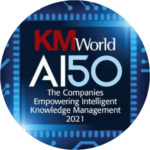Information focuses on organizing, analyzing, and retrieving data that deals with facts and figures. It is relevant data that has a purpose but does not in and of itself convey knowledge.
Knowledge is more difficult to define. The main difference between knowledge and information is that knowledge cannot be truly be handled or “managed,” because it resides in the minds of people who possess it.
Knowledge management creates ideal conditions for individuals to learn using another person’s information and experience. It depends on the successful translation of someone’s learned and experiential expertise into relevant information that is shared and used by others for the benefit of an organization.
Document Management vs. Knowledge Management
Any organization that wants to remain competitive in a dynamic marketplace must understand the difference between document management and knowledge management. Traditionally, IM has not considered how people learn, validate, create, and share knowledge. It’s about the physical collection, organization, and storage of hard data.
KM, on the other hand, has a much broader ambition: finding, understanding, enabling and encouraging employees by creating a company culture and process that builds on what, how, why, and who of information.

Knowledge Management and Information Systems
When it comes to information vs. knowledge management, it’s safe to say that information management serves a purpose, but effective knowledge management is key to your organization’s success.
Knowledge management:
- Builds a “wisdom environment” by making learning routine and building knowledge based on experience that is then used to streamline operations and improve processes
- Facilitates decision-making capabilities by cutting through enormous amounts of data to get to the information you need to improve strategic choices
- Stimulates company-wide cultural change and innovation by encouraging collaboration and the free flow of ideas.
Companies that fail to share knowledge pay an enormous price for doing so. That makes it imperative for your organization to actively manage its knowledge so to increase its chances of success.
Knowledge Management and Information Systems
Information and knowledge management systems are both important to your organization’s operations. Knowledge management and information systems for KM represent an opportunity to extract additional benefits from your organization’s existing investment in computers, databases, and networks. They can be integrated to support knowledge management in many ways.
In the past, companies relied on computer-stored data to provide them with the information needed to solve problems. KM puts the focus on discovering knowledge that responds to the changing environment.
Information is usually explicit (the what) while knowledge is implicit (the how). Knowledge management software is used to increase decision-making capabilities based on a multitude of individual experience and skill, not just data and statistics.
To determine the software most appropriate for your needs, consider whether it:
- Actually performs as-needed
- Is easy to use
- Provides flexibility in the development of pertinent knowledge
- Provides in-depth analyses
A KM system must also have the ability to be deployed company-wide. This increases information-sharing and decreases costs. Otherwise, you risk creating silos that are difficult to navigate. This has a negative effect on productivity.
Conclusion
To sum up the philosophical differences between IM and KM:
- Information is not always knowledge and knowledge doesn’t always inform.
- Information is physical; knowledge is mental.
- Knowledge is shared but is not instantaneously absorbed.
- One person’s knowledge is merely information to another person.
In the end, KM systems are important organizational assets that help you achieve organizational efficiency, competitive advantage, maximize potential, and manage intellectual capital. KM tools provide the resources you need and can be easily tailored to fit your organization’s specific needs.
Knowledge is power. That makes it especially important to learn how to use that power to your company’s benefit.
The right KM software helps you speed up access to information and knowledge, improve the efficiency of your organization’s operating units and business processes, and increase employee and customer satisfaction.







